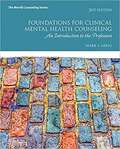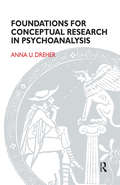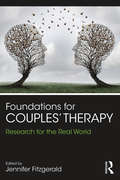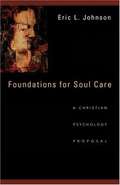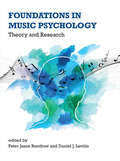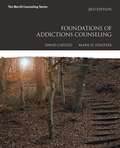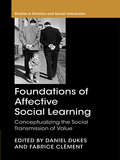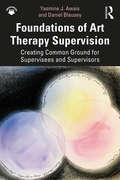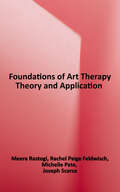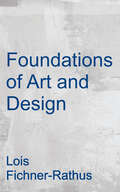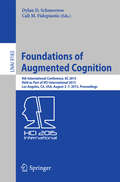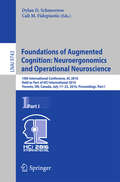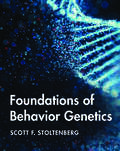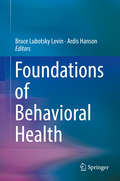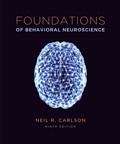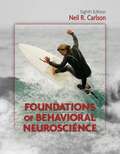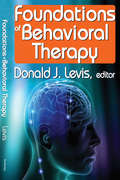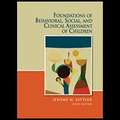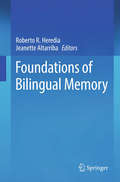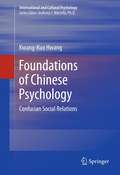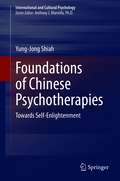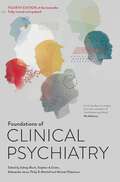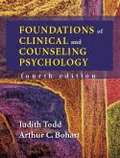- Table View
- List View
Foundations for Clinical Mental Health Counseling: An Introduction to the Profession
by Mark GerigMark Gerig’s Foundations of Clinical Mental Health Counseling gives readers a fresh perspective on today’s clinical mental health counseling profession that is both practical and academically informed. Drawing on his experience as a counselor educator, practitioner, supervisor and manager in agency and behavioral health settings, as well as on his leadership positions in professional associations, the author shows readers what it truly means to be a relevant clinical mental health counselor who delivers effective treatment in an ever-changing contemporary context. <p><p> With the goals of helping current and future counselors ensure that they are helpful to their clients, marketable to potential employers, and relevant voices in front of stakeholders or public policymakers, Dr. Gerig presents a well-informed description of pertinent settings, public policies, and trends. The new edition includes new applications, expanded information, and a wealth of new content.
Foundations for Conceptual Research in Psychoanalysis (Monograph Series Of The Psychoanalysis Unit Of University College London And The Anna Freud Centre #No. 5)
by Anna U. DreherIn clear language and with an extraordinary depth of scholarship, Dreher describes the history of psychoanalytic research and dissects the structure of empirical and conceptual research endeavours.
Foundations for Couples' Therapy: Research for the Real World
by Jennifer FitzgeraldAs a quality resource that examines the psychological, neurobiological, cultural, and spiritual considerations that undergird optimal couple care, Foundations for Couples’ Therapy teaches readers to conduct sensitive and comprehensive therapy with a diverse range of couples. Experts from social work, clinical psychotherapy, neuroscience, social psychology, and health respond to one of seven central case examples to help readers understand the dynamics within each partner, as well as within the couple as a system and within a broader cultural context. Presented within a Problem-Based Learning approach (PBL), these cases ground the text in clinical reality. Contributors cover critical and emerging topics like cybersex, emotional well-being, forgiveness, military couples, developmental trauma, and more, making it a must-have for practitioners as well as graduate students.
Foundations for Soul Care: A Christian Psychology Proposal
by Eric L. JohnsonEric Johnson makes an important contribution to the field of Christian counseling by presenting a detailed overview and appreciative but critical evaluation of the reigning paradigms in the field of Christian counseling, particularly biblical counseling and integration and offers a new framework for the care of souls that is comprehensive in scope, yet flows from a Christian understanding of human beings what amounts to a distinctly Christian version of psychology.
Foundations for Tracing Intuition: Challenges and Methods
by Andreas Glöckner Cilia WittemanThe study of intuition and its relation to thoughtful reasoning is a burgeoning research topic in psychology and beyond. While the area has the potential to radically transform our conception of the mind and decision making, the procedures used for establishing empirical conclusions have often been vaguely formulated and obscure. This book fills a gap in the field by providing a range of methods for exploring intuition experimentally and thereby enhancing the collection of new data. The book begins by summarizing current challenges in the study of intuition and gives a new foundation for intuition research. Going beyond classical dual-process models, a new scheme is introduced to classify the different types of processes usually collected under the label of intuition. These new classifications range from learning approaches to complex cue integration models. The book then goes on to describe the wide variety of behavioural methods available to investigate these processes, including information search tracing, think aloud protocols, maximum likelihood methods, eye-tracking, and physiological and non-physiological measures of affective responses. It also discusses paradigms to investigate implicit associations and causal intuitions, video-based approaches to expert research, methods to induce specific decision modes as well as questionnaires to assess individual preferences for intuition or deliberation. By uniquely providing the basis for exploring intuition by introducing the different methods and their applications in a step-by-step manner, this text is an invaluable reference for individual research projects. It is also very useful as a course book for advanced decision making courses, and could inspire experimental explorations of intuition in psychology, behavioural economics, empirical legal studies and clinical decision making.
Foundations in Human Development (Second Edition)
by Jerry J. Bigner Troianne GraysonFoundations in Human Development is a comprehensive and engaging introduction to life span development. With a unique blend of classical studies and cutting-edge research, the reader is provided a context in which he or she is able to appreciate the historical foundations of life span development, as well as current themes and findings.
Foundations in Music Psychology: Theory and Research (The\mit Press Ser.)
by Daniel J. Levitin Peter Jason RentfrowA state-of-the-art overview of the latest theory and research in music psychology, written by leaders in the field.This authoritative, landmark volume offers a comprehensive state-of-the-art overview of the latest theory and research in music perception and cognition. Eminent scholars from a range of disciplines, employing a variety of methodologies, describe important findings from core areas of the field, including music cognition, the neuroscience of music, musical performance, and music therapy. The book can be used as a textbook for courses in music cognition, auditory perception, science of music, psychology of music, philosophy of music, and music therapy, and as a reference for researchers, teachers, and musicians. The book's sections cover music perception; music cognition; music, neurobiology, and evolution; musical training, ability, and performance; and musical experience in everyday life. Chapters treat such topics as pitch, rhythm, and timbre; musical expectancy, musicality, musical disorders, and absolute pitch; brain processes involved in music perception, cross-species studies of music cognition, and music across cultures; improvisation, the assessment of musical ability, and singing; and music and emotions, musical preferences, and music therapy.ContributorsFleur Bouwer, Peter Cariani, Laura K. Cirelli, Annabel J. Cohen, Lola L. Cuddy, Shannon de L'Etoile, Jessica A. Grahn, David M. Greenberg, Bruno Gingras, Henkjan Honing, Lorna S. Jakobson, Ji Chul Kim, Stefan Koelsch, Edward W. Large, Miriam Lense, Daniel Levitin, Charles J. Limb, Psyche Loui, Stephen McAdams, Lucy M. McGarry, Malinda J. McPherson, Andrew J. Oxenham, Caroline Palmer, Aniruddh Patel, Eve-Marie Quintin, Peter Jason Rentfrow, Edward Roth, Frank A. Russo, Rebecca Scheurich, Kai Siedenburg, Avital Sternin, Yanan Sun, William F. Thompson, Renee Timmers, Mark Jude Tramo, Sandra E. Trehub, Michael W. Weiss, Marcel Zentner
Foundations of Addictions Counseling (3rd Edition)
by David Capuzzi Mark D. StaufferA practical collection of tools and strategies for prospective addictions counselors that includes a solid foundation of research, theory, and history . Practical and comprehensive, Foundations of Addiction Counseling explores an array of techniques and skills that a new practitioner will need in the real world while providing a thorough review of the research, theory, and history of addiction counseling. With chapters written by expert scholars, this text covers many topics in-depth often ignored by other comparable books, such as professional issues in addictions counseling, the assessment of client strengths, gender issues in substance abuse, working in rehabilitation centers, and working with clients with disabilities. Also available with MyCounselingLab® This title is also available with MyCounselingLab--an online homework, tutorial, and assessment program designed to work with the text to engage students and improve results. Within its structured environment, students see key concepts demonstrated through video clips, practice what they learn, test their understanding, and receive feedback to guide their learning and ensure they master key learning outcomes.
Foundations of Affective Social Learning: Conceptualizing the Social Transmission of Value (Studies in Emotion and Social Interaction)
by Daniel Dukes Fabrice ClémentWritten by experts in comparative, developmental, social, cognitive and cultural psychology, this book introduces the novel concept of affective social learning to help explain why what matters to us, matters to us. In the same way that social learning describes how we observe other people's behaviour to learn how to use a particular object, affective social learning describes how we observe other people's emotions to learn how to value a particular object, person or event. As such, affective social learning conceptualises the transmission of value from a given culture to a given person and reveals why the things that are so important to us can be of no consequence at all to others.
Foundations of Art Therapy Supervision: Creating Common Ground for Supervisees and Supervisors
by Daniel Blausey Yasmine J. AwaisFoundations of Art Therapy Supervision serves as a reference guide for art therapists who have found themselves in supervisor roles without prior training and supervisees hoping to learn what to expect from the supervision relationship, and illustrates how to receive and provide clinical art therapy supervision. Written by two art therapists with over 35 years of collective supervision experience, this new resource includes a framework for providing effective supervision in the classroom and in the field, case studies and art-based supervisory exercises, and guidance for new professionals seeking certification or licensure. Chapters weave the authors’ supervision experience with a significant literature review, and feature explanations on how professional identities (art therapist, psychotherapist, counselor, supervisor, supervisee, administrator, educator, etc.) and personal identities (gender, race, sexuality, etc.) influence the supervisory and therapeutic relationships. This book will teach supervisees how to make the most of their experience while simultaneously providing a comprehensive reference for practicing supervisors.
Foundations of Art Therapy: Theory and Applications
by Joseph Scarce Meera Rastogi Rachel P. Feldwisch Michelle PateThis is an essential and comprehensive introduction to the field of art therapy that blends relevant psychological and neuroscience research, theories, and concepts and infuses cultural diversity throughout each chapter. <p><p>The text includes full color photos, informative charts, and case examples and is divided into four parts beginning with the basics of art therapy knowledge and concluding with professional practices in art therapy. The fundamentals of art therapy section includes coverage of art therapy founders, art materials, multicultural perspectives, intersections with neuroscience, and research methods. <p><p>An overview and in-depth explorations of different theoretical approaches to the practice of art therapy are covered in the second part of the book. A bio-psycho-social approach integrates current research on art therapy with specific populations (children, mental health, older adults, and trauma). <p><p>The book concludes with art therapy professional practices in group concepts, community-based art therapy, and developing a career in the field. Each chapter contains chapter objectives, practical applications, ethical considerations, reflection questions, experiential exercises, and a list of terms. The unique, practical, and interdisciplinary approach of this text provides a solid base for understanding the field of art therapy and is well suited for use in undergraduate art therapy courses. This book will appeal to those who want an introduction to the field's theories, research, and practice and those seeking a comprehensive understanding on the foundations of art therapy.
Foundations of Art and Design
by Lois Fichner-RathusPacked with hundreds of examples of classic and contemporary art, FOUNDATIONS OF ART AND DESIGN, 2E delivers a comprehensive guide to basic design that provides the ideal foundation to design principles. Appealing to readers at every ability level, the text's logical and structured organization moves from micro to macro topics, enabling learners to build on ideas and concepts of design and better understand the material. A running glossary defines key terms in the margins of the text, while two Visual Glossaries at the end of the book focus on styles and mediums. In addition, new "Theory and Practice" boxes help readers more deeply analyze artwork, and "Artists on Art" boxes offer insight from professional artists.
Foundations of Augmented Cognition
by Dylan D. Schmorrow Cali M. FidopiastisThis book constitutes the proceedings of the 9th International Conference on the Foundations of Augmented Cognition, AC 2015, held as part of the 17th International Conference on Human-Computer Interaction, HCII 2015, which took place in Los Angeles, CA, USA, in August 2015. HCII 2015 received a total of 4843 submissions, of which 1462 papers and 246 posters were accepted for publication after a careful reviewing process. These papers address the latest research and development efforts and highlight the human aspects of design and use of computing systems. The papers thoroughly cover the entire field of Human-Computer Interaction, addressing major advances in knowledge and effective use of computers in a variety of application areas. The 78 papers presented in the AC 2015 proceedings address the following major topics: cognitive performance and work load, BCI and operational neuroscience, cognition, perception and emotion measurement, adaptive and tutoring training, applications of augmented cognition.
Foundations of Augmented Cognition: Neuroergonomics and Operational Neuroscience
by Dylan D. Schmorrow Cali M. FidopiastisThe 13th International Conference on Human-Computer Interaction, HCI Inter- tional 2009, was held in San Diego, California, USA, July 19-24, 2009, jointly with the Symposium on Human Interface (Japan) 2009, the 8th International Conference on Engineering Psychology and Cognitive Ergonomics, the 5th International Conference on Universal Access in Human-Computer Interaction, the Third International Conf- ence on Virtual and Mixed Reality, the Third International Conference on Internati- alization, Design and Global Development, the Third International Conference on Online Communities and Social Computing, the 5th International Conference on Augmented Cognition, the Second International Conference on Digital Human Mod- ing, and the First International Conference on Human Centered Design. A total of 4,348 individuals from academia, research institutes, industry and gove- mental agencies from 73 countries submitted contributions, and 1,397 papers that were judged to be of high scientific quality were included in the program. These papers - dress the latest research and development efforts and highlight the human aspects of the design and use of computing systems. The papers accepted for presentation thoroughly cover the entire field of human-computer interaction, addressing major advances in knowledge and effective use of computers in a variety of application areas.
Foundations of Behavior Genetics
by Scott F. StoltenbergFoundations of Behavior Genetics provides a forward-looking introduction to this fascinating field. Written by an experienced teacher and researcher, this text focuses on concepts, methods, and findings that inform our understanding of heredity–behavior relations. The book's neuroscience perspective asks students to think about potential neural mechanisms involved in pathways from genes to behavior. While the text is primarily focused on human behavior genetics, it also emphasizes the importance of non-human animal models in experimental studies, as well as their evolutionary connections to humans. Part I covers the history of behavior genetics and the basics of non-molecular genetics; Part II discusses molecular genetics and neurogenetics; Part III addresses various behavioral disorders; and Part IV explores health, social behavior, and ethical implications. The text includes detailed chapter summaries, several “Check-up” questions after major sections that test student understanding, and recommended readings. Instructors are provided with a test bank of multiple-choice items and hi-res JPEGs of the many illustrations created for the book.
Foundations of Behavioral Health
by Bruce Lubotsky Levin Ardis HansonThis comprehensive book examines the organization, financing, delivery, and outcomes of behavioral health (i.e., alcohol, drug abuse, and mental health) services from both U.S. and global perspectives. Addressing the need for more integrative and collaborative approaches in public health and behavioral health initiatives, the book covers the fundamental issues in behavioral health, including epidemiology, insurance and financing, health inequities, implementation sciences, lifespan issues, cultural responsiveness, and policy.Featuring insightful research from scholars in an interdisciplinary range of academic and professional fields, chapters fall into three distinct sections:Overview: Outlines the defining characteristics of behavioral health services and identifies significant challenges in the fieldAt-Risk Populations: Explores critical issues for at-risk populations in need of behavioral health services, including children in school environments, youth in juvenile justice systems, and persons with developmental disabilities, among othersServices Delivery: Presents a rationale for greater integration of health and behavioral health services, and contextualizes this explanation within global trends in behavioral health policy, systems, and servicesAn in-depth textbook for graduate students studying public health, behavioral health, social work policy, and medical sociology, as well as a useful reference for behavioral health professionals and policy makers, Foundations of Behavioral Health provides a global perspective for practice and policy in behavioral health. It promotes better understanding of the importance of integrating population health and behavioral health services, with an eye towards improving and sustaining public health and behavioral health from national, regional, and global perspectives.
Foundations of Behavioral Neuroscience
by Neil R. CarlsonThe ninth edition of Foundations of Behavioral Neuroscience offers a concise introduction to behavioral neuroscience. The text incorporates the latest studies and research in the rapidly changing fields of neuroscience and physiological psychology. The theme of strategies of learning helps readers apply these research findings to daily life. Foundations of Behavioral Neuroscience is an ideal choice for the instructor who wants a concise text with a good balance of human and animal studies.
Foundations of Behavioral Neuroscience (Eighth Edition)
by Neil R. Carlson'Foundations of Behavioral Neuroscience' offers a briefer, sixteen chapter introduction to the foundations of physiology, incorporating the latest studies and research in the rapidly changing fields of neuroscience and physiological psychology.
Foundations of Behavioral Therapy
by Donald J. LevisThe term "behavior therapy" is applied to many techniques and strategies, some theoretically based and some not, unified by a common goal: the application of learning principles to the treatment of psychopathology. Although treatment paradigms have changed, with the increased use of drug therapy, this classic volume provides important information about traditional treatments involving therapist and patient. In this volume, comprehensive reviews of the main positions in behavior therapy show how orientations differ from each other and provide a forum for the critical evaluation of each.The editor has assigned to each contributor a review of the behavioral therapy position in which he is distinguished and a commentary on one of the other positions. Levis provides an introduction to the history, principles, and theory underlying the field, asking if behavior therapy is the "fourth therapeutic revolution" (after Pinel, Freud, and Community Mental Health). Bradley Bucher and O. Ivar Lovaas are concerned with the application of operant conditioning techniques to child populations. Leonard Krasner reviews the token economy approaches, illustrating how these techniques apply to the adult hospitalized population and to society.Followed by this, Cyril Franks reviews the Pavlovian conditioning approach, while Peter Lang surveys Wolpei?1/2s systematic desensitization. Implosive therapy is viewed by Thomas Stampfl as an attempt to bridge the conditioning and psychoanalytic models; and Julian Rotter, a pioneer in the field, reviews his social learning theory approach. Judson Brown provides an analytic overview to the collection. A comprehensive look at the orientations and treatment techniques that comprise the field of behavior therapy, this book is important reading for clinical psychologists, psychiatrists, social workers, and related mental health specialists.
Foundations of Behavioral, Social, and Clinical Assessment of Children: Sixth Edition
by Jerome M. SattlerThe Sixth Edition of Foundations of Behavioral, Social, and Clinical Assessment of Children, which also includes the Resource Guide to Accompany Foundations of Behavioral, Social, and Clinical Assessment of Children, Sixth Edition
Foundations of Bilingual Memory
by Jeanette Altarriba Roberto R. HerediaFoundations of Bilingual Memory provides a valuable update to the field of bilingual memory and offers a new psychological perspective on how the bilingual mind encodes, stores, and retrieves information. This volume emphasizes theoretical issues, such as classic memory approaches, Compound-Coordinate Bilingualism, Bilingual Dual Coding Theory, and Working Memory, about which relatively little has been written in the bilingual domain. Also covered are: * The neuropsychology of bilingual memory * Applied issues (such as false memories and bilingualism, emotion and memory) * Empirical findings in support of the uniqueness of the different memory systems of the bilingual individual * Connectionist models of bilingualism The volume represents the first book of its kind, in stressing a memory perspective with regards to bilingual speakers. It can serve as an advanced text for both undergraduate and graduate level students and it will be of great interest to the growing number of bilingual teachers and university classes interested in understanding the bilingual mind, as well as in preparing teachers to work with the bilingual individual.
Foundations of Chinese Psychology
by Kwang-Kuo HwangMainstream psychology emanated from European-American and Judeo-Christian philosophical and scientific traditions. The application of this viewpoint, which embeds colonial and imperialist concepts is less relevant to Asian and other indigenous cultures. Although it has been accepted by non-Western scholars in an attempt to emulate Western scientific practice, the mainstream viewpoint is in a process of transformation to accommodate geographically relevant perspectives. In this light, Foundations of Chinese Psychology, bridges the gap between western and eastern traditions and elaborates on theories based on local phenomena, findings, and experiences by research methods that are contextually appropriate. Using a guiding principle of cultural psychology - 'one mind, many mentalities', this book advocates the balancing of a global psychology concept without sacrificing that of a specific locality and people. It analyzes the basics of Confucionism and compares them to Western ethical thinking, arriving at a series of theories concerning social exchange, face, achievement motivation, organizational behaviors, and conflict resolution. Beyond the specifics of a particular culture, this book exemplifies the act of constructing autonomous social science that may be emulated in other non-Western settings. It also serves as an excellent guide for cross-cultural research as well as a caveat on the limitations of presumptive individualism and exclusionary perspectives.
Foundations of Chinese Psychotherapies: Towards Self-Enlightenment (International and Cultural Psychology)
by Yung-Jong ShiahThis book provides an overview of the foundations of Chinese psychotherapy, based on a full consideration of Confucian, Taoist, and Buddhist teachings. Serving as a reliable and practical guide to coping with life’s adversities, the book offers therapeutic techniques to guide clinical practice based on the potential mutual enrichment of these teachings and current psychotherapies, research, and practice. It aims to guide readers towards authentic, durable happiness with novel approaches to a variety of mental health problems.Among the topics addressed: Cultural heritages and mental health Confucian, Taoist, and Buddhist techniques for self-enlightenment psychotherapy Psi mechanisms and related training models Foundations of Chinese Psychotherapies combines modern clinical methods and traditional teachings to form a unique approach to mental health and well-being. It will be a valuable resource for mental health professionals and others who seek to intervene in a variety of mental health problems."A systematic introduction to indigenous Chinese psychotherapy is long overdue.Explicating human nature as envisioned by traditional Chinese thinkers, this book is a timely answer to the increasingly contested question of what it means to be human in an era when gene editing keeps tinkering nature’s design. "Louise Sundararajan, Ph.D., Ed.D., Fellow of the American Psychological Association; Chair and founder of the Task Force on Indigenous Psychology."This is an important book. It builds on the work of K.-S. Yang and K.-K. Hwang in their hope for an indigenous Chinese psychology. This book is the next installment in that progression. The world-wide community of scholars needs to know what an indigenous psychology looks like that is sensitive to the insights of Confucianism, Buddhism and Taoism. This book makes that contribution and it is my hope that it will be widely read."Alvin Dueck, PhD, Distinguished Senior Professor of Psychology, Fuller Graduate School of Psychology, USAFoundations of Chinese Psychotherapies is a valuable introduction to how the Confucian, Taoist, and Buddhist traditions understand the human psyche, and in particular psychic abilities. Yung-Jong Shiah has a unique perspective on these topics, having been trained in both Eastern and Western traditions, and through his deep familiarity with how science has been used to study these intriguing topics. " Dean Radin MS PhD, Chief Scientist, Institute of Noetic Sciences, USA and author Real Magic (2018) and other books.
Foundations of Clinical Psychiatry: Fourth Edition
by Michael Robertson Sidney Bloch Aleksandar Janca Stephen A. Green Philip B. MitchellFoundations of Clinical Psychiatry is the trusted introductory text for students of medicine and other health professions, including psychiatric nursing, psychology, social work and occupational therapy. It has also been the essential reference for family doctors for over quarter of a century.Foundations of Clinical Psychiatry: Fourth Edition has been revised and updated by five editors, leaders in their fields, in collaboration with a new generation of expert psychiatrists. The four-part structure—an introduction to clinical psychiatry; conditions encountered; specific patient groups and clinical settings; and principles and details of typical clinical services, and of biological and psychological treatments—provides a clear overview of clinical practice. It also explores the causes of mental illness and the ethical aspects of its treatment, and covers the full range of psychiatric disorders encountered by health practitioners.The fourth edition emphasises biological, psychological and social factors in assessing and treating patients, includes the integrated use of DSM-5 classification, and provides further reading suggestions. It is richly illustrated with dozens of clinical stories.
Foundations of Clinical and Counseling Psychology
by Judith Todd Arthur C. Bohart'Foundations of Clinical and Counseling Psychology' has now been revised, and the fourth edition explores the latest fundamental theories, methods and empirical findings within the field.
